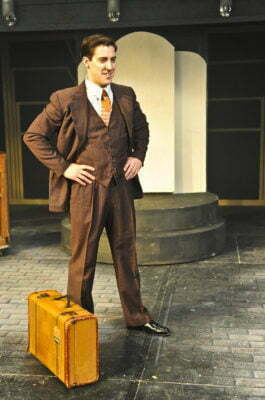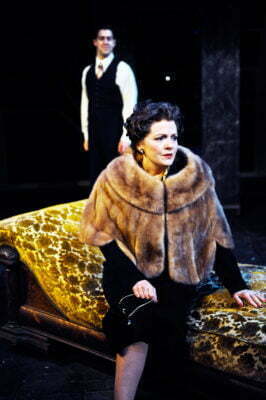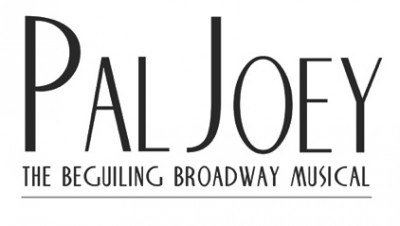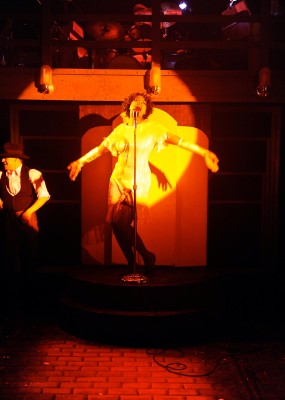Pal Joey
Lyrics by Lorenz Hart
Book by John O’Hara
Direction by Michael Weber
Choreography by Brenda Didier
Produced by Porchlight Music Theatre
Playing at Stage 773
Not even O’Hara’s peculiar plot turns can keep Porchlight’s Pal Joey from singing.
It’s hard to imagine, but the Rodgers and Hart musical Pal Joey—now being given a lively production by Porchlight Music Theatre—is over seventy-years-old. In other words, as much time now stands between us and Pal Joey’s debut 1940 production as stood between it and Gilbert and Sullivan’s earliest collaborations. And the fact that Porchlight has even secured exclusive rights from the Rodgers and Hammerstein Organization to produce the original version almost begs the question: What, after all this time, does Pal Joey continue to offer?

Based on a series of stories John O’Hara wrote for The New Yorker, Pal Joey tells the tale of Joey Evans (Adrian Aguilar), a young rascal recently run out of St. Louis, who finds work as a song and dance man in a sordid nightclub on Chicago’s south side. After heedlessly flirting with the affections of an innocent shopgirl (Laura Savage), Joey soon turns her over for an opportunity to hit the town with the wealthy (and married) socialite, Vera Simpson (Susie McMonagle). And in Vera, Joey finds everything that he’s ever wanted—fame, fortune, status, and even his own hot new Chicago nightspot. But when a small-time crook (Matt Orlando) and his showgirl honey (Sharriese Hamilton) connive to run the two lovers through the proverbial ringer, Joey soon learns the tradeoff for all his blind ambition.
Strange as it seems in retrospect, Pal Joey actually signaled an important milestone in the American musical, featuring one of it’s first true antiheroes (assuming we discount Macheath from Brecht and Weill’s German Threepenny Opera, which had a short-lived New York premiere as early as 1933). Still, by today’s standards, Joey Evan’s inveterate bad boy nature feels almost laughably naive, with most seeing in his thick-headed, libido-driven, gold-digging playboy attitude a beguilingly plucky and ambitious go-getter.
Indeed, social mores have changed considerably since 1940, and today’s audiences, well-schooled in the brute realism that followed in the wake of WWII, will find little especially provocative in Joey Evan’s behavior, thus providing ample enough cover for Adrian Aguilar’s otherwise eminently likable performance. Equipped with boyish good looks and a mischievous smile, Aguilar’s Joey is a hapless puer with a Peter-Pan complex, avoiding commitment to women his own age (or in his own class) only to pursue an Oedipally-tinged relationship with the wealthy Vera Simpson—a woman whose maternal instincts coddle Joey in his infantile behavior, expecting nothing from him even as she’s paying his way. As Vera herself puts it, Joey is less a man than a “half-pint imitation.”

But the fact that Joey Evans is hardly the reprobate he was in 1940 poses certain problems for John O’Hara’s original book. Indeed, the modern consensus indicates it hasn’t fared too well—a fact which even compelled playwright Richard Greenberg to rewrite it for Pal Joey’s lackluster 2008 Broadway revival. Because let’s face it. Joey Evans may be a bit of a tool, but he isn’t a criminal, and what the audience wants is for Joey to learn from his mistakes—not be punished for them.
Unfortunately, O’Hara has a different agenda. Having thus brought Joey to a point of ill-deserved triumph at the end of the first act, O’Hara all but writes Joey out of the second, choosing to shift focus to his two leading ladies and a couple of ne’er-do-well conspirators. O’Hara thus spends an inordinate amount of time clunkily bringing the required pieces into place that will ensure Joey’s downfall, leading to a final scene so ultimately dripping with cynical dejection that it almost makes you cringe. Thus what initially seems premised to us as Joey Evans’s “coming-of-age” story turns darkly jaundiced in the play’s final moments, and for reason that feel more contrived on O’Hara’s end than organic.
But even if one gets the sneaking suspicion that O’Hara’s book no longer delivers the goods, one cannot say the same thing about Rodgers and Hart’s remarkable score, featuring such golden standards from the Great American Songbook as “Bewitched, Bothered and Bewildered,” “I Could Write a Book,” and “Zip.” And in the last analysis, its the music that Pal Joey continues to entice a full seventy years on.
Luckily, under Michael Weber’s inventive direction, Porchlight’s Pal Joey still sings, playfully evoking the subterranean jazz treble of 1930s Chicago—crooning away beneath the train tracks racketing above—even as Brenda Didier’s leggy, show-stopping choreography brings to mind the heyday of the Ziegfeld Follies. Indeed, even if the restitution of O’Hara’s original book leaves the pacing of the show’s latter half a little wanting, Porchlight’s Pal Joey retains its distinction as a show with a thousand little pleasures. Especially notable were Callie Johnson’s uproariously deadpan performance as newspaper reporter Melba Snyder whose scintillating transformation into a vixen burlesque performer, set to the tune of “Zip,” provides the evening’s breakout performance. And Daniel Spagnuolo’s solo dancing executes Didier’s choreography flawlessly and with a fluidity of line that lingers after he’s gone.
But the evening’s highest honor undoubtedly goes to Susie McMonagle as Vera Simpson. Ms. McMonagle’s effortless musical phrasings give the unexpected romantic longing of Hart’s lyrics their full due, serving to anchor Pal Joey in something arguably more “real” than even O’Hara or Hart could have anticipated. And if O’Hara’s wayward plot just so happens to throw McMonagle’s Vera inexplicably centerstage, you will find few this time around willing to complain.
RECOMMENDED
Reviewed by Anthony J. Mangini
Reviewed Tuesday, April 23rd, 2013.
Running time is approximately 2 hours and 30 minutes with one intermission.
Pal Joey runs until May 26th, 2013. Stage 773 is located at 1225 W. Belmont Ave. For tickets call Stage 773’s box office at (773) 327-5252 or visit www.stage773.com. Check out their Theater in Chicago listing at https://www.theatreinchicago.com/pal-joey/5463/.


